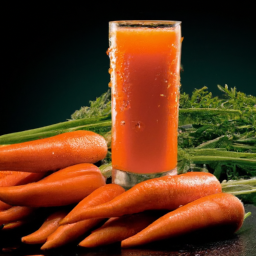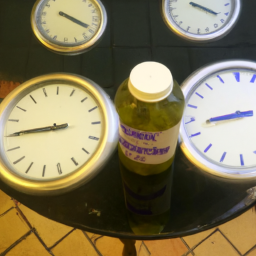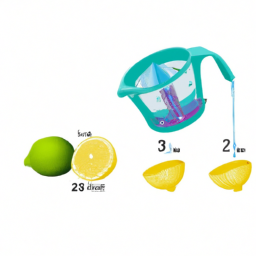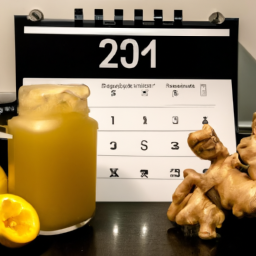As a person who appreciates the health advantages of drinking fresh carrot juice, I frequently ponder over the shelf life of this wholesome beverage. After all, I aim to avoid throwing away any of the valuable juice I’ve prepared, yet I’m equally cautious about not consuming juice that has gone bad.
In this article, I’ll be exploring the perishability of fresh carrot juice and sharing tips for storing and prolonging its shelf life. Fresh carrot juice is known for its high content of vitamins and minerals, including vitamin A, potassium, and beta-carotene. However, like any fresh produce, it can spoil and lose its nutritional value over time.
Understanding how long fresh carrot juice can last is important for ensuring that you’re getting the most out of your drink and avoiding any potential health risks. So, let’s dive into the science of carrot juice perishability and learn how to make the most of this delicious and nutritious beverage.
Key Takeaways
- Fresh carrot juice can spoil and lose nutritional value over time, so it is recommended to drink within 24-48 hours of juicing.
- Storing in an airtight container in the fridge can extend the shelf life, while vacuum sealing, preservatives, glass containers, and cold press juicers can help prolong it even further.
- Freezing can keep fresh carrot juice for up to 8 months.
- Leftover carrot juice can be used in popular recipes such as carrot cake and soup, and can also be repurposed as a natural fertilizer for plants, DIY cleaning solution, or composting for nutrient-rich soil amendment.
Understanding the Perishability of Fresh Carrot Juice
Fresh carrot juice’s perishability is a critical factor to consider, as it only remains viable for a limited amount of time. The process of juice extraction and juicing techniques can affect the shelf life of the juice.
When carrots are juiced, the liquid is separated from the fiber, which can lead to a faster breakdown of the juice. Additionally, juicing techniques such as centrifugal juicing can introduce heat and oxygen into the juice, which also accelerates the spoilage process.
It’s important to consume fresh carrot juice as soon as possible to maximize its nutritional benefits. The longer it sits, the more nutrient loss and bacterial growth will occur. Therefore, it’s recommended to drink fresh carrot juice within 24-48 hours of juicing.
In the next section, we’ll explore how to properly store fresh carrot juice to extend its freshness and shelf life.
Storing Fresh Carrot Juice
When storing carrot juice, it’s best to keep it in an airtight container in the fridge. This helps to extend its shelf life and retain its nutritional value. Here are some tips on how to store fresh carrot juice:
- Use a glass or food-grade plastic container to store the juice.
- Fill the container to the brim to minimize air exposure.
- Label the container with the date of juicing to keep track of its freshness.
- Consume the juice within 2-3 days of juicing for optimal freshness and nutrient content.
Carrot juice benefits are numerous and include improved digestion, boosted immune system, and healthier skin. However, to maximize the benefits of carrot juice, it’s important to use proper juicing techniques and store it correctly.
With these tips, you can enjoy fresh and nutritious carrot juice for longer.
In the next section, we’ll discuss the signs of spoilage to look out for in fresh carrot juice.
Signs of Spoilage
As someone who frequently stores fresh carrot juice, it’s important to be aware of the signs of spoilage.
Visual changes, such as a darker color or cloudiness, can indicate that the juice has gone bad.
Additionally, a sour or off smell and a bitter or unpleasant taste are other red flags to watch out for.
By paying attention to these signs, you can ensure that you’re drinking fresh, healthy carrot juice every time.
Visual Changes
You’ve probably noticed that your vibrant orange carrot juice doesn’t look quite as appealing after a few days in the fridge. One of the most common visual changes that occurs with fresh carrot juice is a shift in color. Over time, the bright orange hue may become duller and less intense.
Additionally, you may notice sediment formation in the bottom of the container, which is normal and caused by natural settling of the juice.
It’s important to note that these visual changes do not necessarily mean that the juice has gone bad. Rather, they are simply signs of natural degradation and can be indicators that the juice is losing some of its nutritional value. However, if you notice any foul or unpleasant odors or tastes, it’s best to discard the juice as it may have gone bad.
Smell and Taste
If you want to know if your fresh carrot juice is still good to drink, just give it a sniff and a taste. The smell of fresh carrot juice should be slightly sweet and earthy. If you detect a sour or fermented odor, it may be a sign that the juice has started to spoil. Similarly, fresh carrot juice should have a slightly sweet and refreshing taste. If the taste is bitter or sour, it may also indicate that the juice is no longer fresh.
To help you determine if your carrot juice is still fresh, here is a table that outlines the possible flavor combinations and sensory preferences of carrot juice:
| Flavor Combination | Sensory Preference |
|---|---|
| Carrot-Ginger | Spicy, earthy |
| Carrot-Apple | Sweet, fruity |
| Carrot-Orange | Tangy, citrusy |
| Carrot-Beet | Earthy, sweet |
By understanding the different flavor combinations and sensory preferences of carrot juice, you can better assess the quality of your juice. If your juice smells and tastes good, you can enjoy it knowing that it is still fresh and safe to drink. However, if you detect any off-putting odors or flavors, it may be time to consider ways to prolong the shelf life of your carrot juice.
Prolonging the Shelf Life
To extend the life of fresh carrot juice, store it in an airtight container in the refrigerator. This will help prevent the growth of bacteria, which can cause the juice to spoil quickly. However, simply storing it in the refrigerator may not be enough to keep it fresh for a longer period of time.
Here are some additional steps you can take to prolong the shelf life of fresh carrot juice:
- Vacuum sealing: This method removes all the air from the container, which can slow down the oxidation process and preserve the nutrients in the juice.
- Adding preservatives: You can add a small amount of lemon juice or ascorbic acid to the juice, which can help prevent the growth of bacteria and fungi.
- Using glass containers: Glass is less permeable than plastic, which can help keep the juice fresh for longer.
- Keeping the juice away from light: Exposure to light can cause the juice to degrade faster, so it’s best to store it in a dark place.
- Using a cold press juicer: This type of juicer produces less heat and air, which can help preserve the nutrients in the juice.
By taking these steps, you can extend the life of fresh carrot juice and enjoy its health benefits for a longer period of time. If you still can’t finish the juice before it spoils, you may want to consider freezing it for later use.
Freezing Fresh Carrot Juice
When it comes to preserving your delicious and nutritious carrot juice, freezing is a fantastic option that allows you to enjoy it at a later time. Freezing is a simple and effective way to extend the shelf life of your carrot juice without compromising its quality. Here are some tips for freezing fresh carrot juice:
| Tips for Freezing Carrot Juice |
|---|
| Use airtight containers or freezer bags to prevent freezer burn. |
| Leave some space at the top of the container to allow for expansion. |
| Label the container with the date of freezing to keep track of freshness. |
By following these tips, you can ensure that your carrot juice stays fresh and delicious for up to 8 months in the freezer. When you’re ready to enjoy your frozen carrot juice, simply thaw it in the refrigerator overnight and give it a good shake before drinking.
Now that you know how to freeze your carrot juice, let’s move on to some recipes for using up leftover carrot juice.
Recipes for Using Up Leftover Carrot Juice
Get ready to indulge in some delicious and creative recipes that’ll help you make the most of your leftover carrot juice! Don’t let that nutritious juice go to waste, as there are plenty of ways to use it up in sweet treats and other dishes.
One popular recipe is carrot cake, which can be made with either grated or juiced carrots. Simply add your leftover carrot juice to the batter for an extra boost of flavor and nutrition.
Another creative recipe to try is carrot and ginger soup, which can be made with just a few simple ingredients. Start by sautéing some onions and garlic in a pan, then add in your leftover carrot juice and grated ginger. Let it simmer for a few minutes, then blend everything together for a smooth and creamy soup.
These are just a few ideas for how to use up your leftover carrot juice, so get creative and see what other delicious recipes you can come up with!
Now that you know how to use up your leftover carrot juice, let’s move on to the health benefits of fresh carrot juice.
Health Benefits of Fresh Carrot Juice
I love drinking fresh carrot juice and it turns out that it’s also very good for me. Carrots are packed with essential vitamins and minerals that are vital for maintaining good health.
Additionally, fresh carrot juice is high in antioxidants, which help to protect cells from damage caused by free radicals.
Nutritional Value
You’ll be pleased to know that fresh carrot juice is a fantastic source of vitamins and minerals. Carrots themselves are packed with beta-carotene, which is converted into Vitamin A in our bodies. Vitamin A is essential for healthy eyesight, immune system function, and skin health.
In addition to Vitamin A, fresh carrot juice contains a variety of other important nutrients, such as Vitamin K, potassium, and fiber. Carrot juice benefits can be maximized by using certain juicing techniques, such as using a slow juicer to extract the juice rather than a high-speed blender.
Slow juicers are able to extract more nutrients from the carrots while preserving their natural enzymes and antioxidants. These antioxidants, which include carotenoids and flavonoids, are what give carrots their bright orange color and provide the body with powerful protection against oxidative stress.
In the next section, we’ll explore the antioxidant properties of fresh carrot juice in more detail.
Antioxidant Properties
As discussed in the previous subtopic, fresh carrot juice is a nutrient-dense beverage that provides several health benefits. One of the most significant benefits of drinking fresh carrot juice is its antioxidant properties. Antioxidants are molecules that protect the body against free radicals, which are unstable molecules that can cause cell damage and contribute to chronic diseases.
Carrots contain several antioxidants, including beta-carotene, vitamin C, and polyphenols. These compounds have been shown in scientific studies to have various health benefits, such as reducing inflammation, improving immune function, and preventing cancer. Additionally, the combination of these antioxidants in fresh carrot juice may have a synergistic effect, meaning that they work together to enhance their health benefits.
Overall, drinking fresh carrot juice can provide numerous antioxidant benefits that may contribute to better health and a reduced risk of chronic diseases.
Moving on to the next section, there are several alternatives to fresh carrot juice that may also provide similar health benefits.
Alternatives to Fresh Carrot Juice
If you’re looking for an alternative to fresh carrot juice, try blending carrots with other fruits and vegetables for a delicious and nutritious smoothie.
There are many juice alternatives that can provide similar health benefits as fresh carrot juice. For example, you can blend carrots with apples, ginger, and lemon for a refreshing and immune-boosting drink. You can also add spinach, kale, or cucumber to your carrot juice recipe for an extra dose of vitamins and minerals.
Another option is to try bottled carrot juice, which can be found in most grocery stores. However, be sure to check the label for added sugars and preservatives. If you prefer a more natural option, look for cold-pressed carrot juice, which is made without heat and retains more nutrients.
Overall, there are many ways to enjoy the health benefits of carrots without drinking fresh carrot juice every day.
If you find yourself with spoiled juice, there are eco-friendly ways to dispose of it. One option is to use it as a natural fertilizer for your plants. Simply dilute the juice with water and pour it onto your soil. The nutrients in the juice will help your plants grow strong and healthy.
Another option is to use the juice as a natural cleaning solution. The acidity in the juice can help remove stains and disinfect surfaces. With these simple tips, you can enjoy the benefits of carrot juice while minimizing waste.
Eco-Friendly Ways to Dispose of Spoiled Juice
Don’t let your spoiled juice go to waste – there are eco-friendly ways to dispose of it!
One option is to compost it. Composting is the process of breaking down organic materials, such as spoiled juice, into a nutrient-rich soil amendment. Simply add your spoiled juice to a compost pile or bin, along with other organic materials like food scraps, yard waste, and paper products. Over time, the materials will decompose and turn into compost that can be used to fertilize plants in your garden or yard.
Another option is to use the spoiled juice as a DIY cleaning solution. The acid in spoiled juice can act as a natural cleaner and help remove stains and odors from surfaces. Mix the spoiled juice with equal parts water and use it to clean countertops, floors, and other surfaces in your home. This is a great way to avoid using harsh chemicals and reduce your environmental impact.
So don’t throw away your spoiled juice – try composting it or using it as a natural cleaning solution instead!
Frequently Asked Questions
Can I mix fresh carrot juice with other juices?
I love experimenting with juice combinations based on my taste preferences. Mixing fresh carrot juice with other juices is a great way to create unique flavors. Consider adding apple or ginger for a zesty kick.
Does the freshness of carrots affect the shelf life of the juice?
Carrot juice freshness affects its nutritional benefits. Freshly made carrot juice contains more nutrients than juice that has been stored for a long time. The longer the juice is stored, the more nutrients it loses.
Is it safe to drink carrot juice after the expiration date?
Drinking expired carrot juice is not recommended as it poses health risks. To extend shelf life, refrigerate immediately after juicing and consume within 24-48 hours. Safety should always come first.
Can I store fresh carrot juice in a plastic container?
I recommend storing fresh carrot juice in a glass container to avoid long term effects of plastic leaching. An alternative storage option is a stainless steel container. Plastic containers may contain harmful chemicals that can leach into the juice over time.
How long can I keep fresh carrot juice in the fridge before it starts to lose its nutritional value?
I recommend consuming fresh carrot juice within 24 hours to maximize its nutritional benefits. The longer it sits in the fridge, the more it oxidizes and loses nutrients. Incorporating fresh juices into a juice cleanse can provide numerous health benefits.
Conclusion
In conclusion, fresh carrot juice is a nutritious and delicious beverage that can provide numerous health benefits. However, it’s important to understand its perishability and take necessary precautions to store it properly and avoid spoilage. By following the tips mentioned in this article, you can prolong the shelf life of your fresh carrot juice and enjoy its goodness for longer.
For example, let’s consider a case study of a busy individual who wants to incorporate fresh carrot juice into their daily routine. They purchase a large batch of carrots and make a week’s worth of juice at once, storing it in an airtight container in the fridge. However, they forget to consume it all within the recommended timeframe and notice signs of spoilage.
This leads to a waste of resources and a missed opportunity to reap the benefits of fresh carrot juice. By being mindful of the shelf life and taking steps to prolong it, such as freezing or using leftover juice in recipes, they can prevent such incidents and enjoy the full benefits of this healthy beverage.








